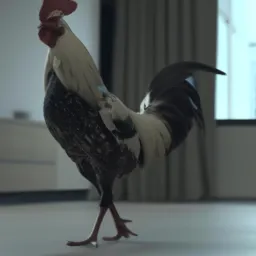How to Keep a Single Chicken as a Pet: Tips and Tricks
Are you ready to take on the adventure of keeping a single chicken as a pet?
If so, then this guide is for you!
Keeping a chicken as a pet can be a rewarding experience, but it requires time and effort.
In this blog post, we will cover everything you need to know about how to keep a single chicken as a pet, from choosing the right breed to handling common behavioral issues. Let’s get started!
Introduction to Keeping a Single Chicken as a Pet:
Keeping a chicken as a pet has become increasingly popular in recent years.
Many people enjoy having fresh eggs delivered straight to their doorstep, while others simply love spending time with these fascinating creatures.
However, before you dive into the world of chicken ownership, there are some things you should consider.
First and foremost, raising a chicken takes commitment and dedication. You will need to provide your bird with food, water, shelter, and care every day.
Also, depending on where you live, there may be laws or regulations that govern backyard poultry farming.
Make sure to do your research and check with your local authorities before bringing home your new feathered friend.
Choosing the Right Breed for Your Home:
When it comes to selecting a chicken breed for your home, there are many factors to consider.
Some breeds are better suited for small spaces, while others require more room to roam.
Some breeds lay larger eggs than others, and some have specific temperaments that make them ideal companions.
Do your research and choose a breed that fits your lifestyle and needs.
See also Everything You Need to Know About Egg-Laying Abilities of Rhode Island Reds
Popular breeds for beginners include:
- Silkies
- Bantams
- Pekins
These birds are small, friendly, and easy to handle.
Setting Up a Comfortable Coop and Run:
Once you have chosen your chicken breed, it’s time to set up a comfortable coop and run.
The size of your coop will depend on the number of chickens you plan to keep, but generally speaking, each bird needs at least four square feet of space inside the coop and ten square feet outside.
Your coop should be well-ventilated, dry, and protected from predators. It should also have a nest box for egg laying and perches for sleeping.
Outside, your run should be covered in soft ground cover like straw or wood shavings to protect your chicken’s feet and prevent injury.
Feeding and Caring for Your Chicken:
Chickens are omnivores and eat a variety of foods including grains, seeds, insects, and vegetables.

A balanced diet includes commercial feed, which provides all the necessary nutrients, along with supplementary treats like fruits and veggies.
Always provide clean drinking water and change it frequently to ensure your chicken stays healthy.
Regular maintenance such as cleaning out the coop and run, checking for parasites, and trimming nails is also important.
Handling Common Behavioral Issues:
Like any animal, chickens can exhibit certain behaviors that might seem strange or unexpected.
For example, they may peck at themselves or other birds, scratch furniture or walls, or even attack humans.
To address these issues, try providing your chicken with plenty of exercise and mental stimulation through activities like free range time or puzzle toys. You can also use positive reinforcement techniques to teach desirable behaviors and discourage unwanted ones.
See also Benefits of Using Oyster Shells for Chickens
Finally, if you notice any signs of illness or injury, seek veterinary attention immediately.
Keeping a single chicken as a pet can be an incredibly rewarding experience.
With proper planning, preparation, and care, you can create a safe and happy environment for your feathery friend. Good luck on your journey!
